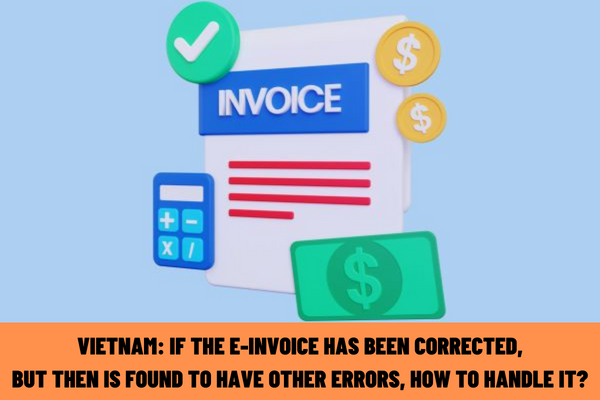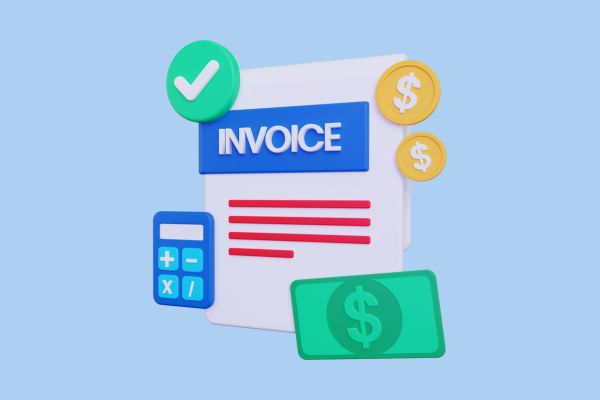Vietnam: If the e-invoice has been corrected, but then is found to have other errors, how to handle it?
If the e-invoice has been corrected, but then is found to have other errors, how to handle it?
Pursuant to Point c, Clause 1, Article 7 of Circular No. 78/2021/TT-BTC stipulating as follows:
Handling of erroneous e-invoices and e-invoice datasheets sent to tax authorities
1. Erroneous e-invoices:
…
c) If the erroneous e-invoice has been handled by correction or replacement by the seller as prescribed in Point b Clause 2 Article 19 of Decree No. 123/2020/ND-CP, but then is found to have other errors, these errors shall be handled adopting the same method as the initial error;
Thus, in case the erroneous e-invoice has been handled by correction or replacement by the seller, but then is found to have other errors, these errors shall be handled adopting the same method as the initial error.

Vietnam: If the e-invoice has been corrected, but then is found to have other errors, how to handle it?
How to correct the erroneous invoice sent to the buyer?
Pursuant to the provisions of Point b, Clause 2, Article 19 of Decree No. 123/2020/ND-CP guiding the handling of erroneous invoices in Vietnam as follows:
Handling of erroneous invoices in Vietnam
…
2. If an authenticated or unauthenticated e-invoice which has been sent to the buyer is detected by either the buyer or seller to contain errors, it shall be handled as follows:
…
b) If the information about TIN, amount, tax rate, tax amount or goods on the invoice is wrong, the error shall be handled by adopting one of the following methods:
b1) The seller shall create an e-invoice to correct the erroneous one. The seller and the buyer shall prepare a document specifying the errors as agreed upon between them before the seller issues a correction e-invoice.
The correction e-invoice shall bear the text “Điều chỉnh cho hóa đơn Mẫu số... ký hiệu... số... ngày... tháng... năm” (“This invoice corrects the invoice form No……….., reference No………, No………dated……….”).
b2) The seller issues a new e-invoice to replace the erroneous one. The seller and the buyer shall prepare a document specifying the errors as agreed upon between them before the seller issues a new e-invoice to replace the erroneous one.
The replacing invoice shall bear the text “Thay thế cho hóa đơn Mẫu số... ký hiệu... số... ngày... tháng... năm” (“This invoice replaces the invoice form No……….., reference No………, No………dated……….”).
The seller shall add the digital signature on the e-invoice which is issued to correct or replace the erroneous one, then send it to the buyer (in case of unauthenticated invoices) or send it to the tax authority for its issue of a new authentication code (in case of authenticated invoices).
Thus, if the information about TIN, amount, tax rate, tax amount or goods on the invoice is wrong, the error shall be handled by adopting one of the following methods: A new e-invoice replaces an erroneous one, or an e-invoice corrects an already erroneous invoice.
In which case must enterprises suspend use of e-invoices in Vietnam?
Pursuant to Article 16 of Decree No. 123/2020/ND-CP stipulating the suspension of the use of electricity bills.
According to that, enterprises, business entities, other organizations, household or individual businesses shall suspend their use of authenticated and unauthenticated e-invoices in the following cases:
- An enterprise, business entity, other organization, household business or individual business has its TIN invalidated;
- An enterprise, business entity, other organization, household business or individual business does not operate at the registered location as verified and announced by the tax authority;
- An enterprise, business entity, other organization, household business or individual business has sent a notification of business suspension to a competent authority;
- An enterprise, business entity, other organization, household business or individual business is banned from using e-invoices by the tax authority for the purpose of enforcement of payment of tax debts;
- E-invoices are used to sell smuggled goods, banned goods, counterfeits, goods violating intellectual property rights as detected and informed by competent authorities;
- E-invoices are used for short selling of goods or services for fraudulent purposes as detected and informed by competent authorities;
- A business registration authority or competent authority requests an enterprise to suspend operation in a conditional business line after finding that this enterprise does not fully satisfy the business conditions prescribed by law.
If the tax authority, through inspection, discovers that the enterprise is established for the purpose of trade and use of illegal e-invoices or illegal use of e-invoices for tax evasion purposes, the enterprise shall face administrative penalties and be suspended from use of e-invoices according to the decision issued by the tax authority.
LawNet
